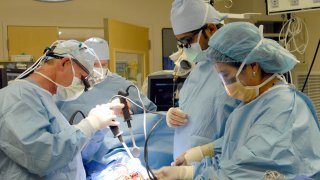
People are more likely to buy things when prices end in 99 cents rather than rounded up to the next dollar, or cars with mileage under 1,000 instead of past that mark. Now researchers say something similar might be happening with age perception and heart surgery.
A U.S. study out Wednesday finds that heart attack patients who turned 80 within the previous two weeks were less likely to get bypass surgery than those who were two weeks shy of that birthday, even though the age difference is less than a month.
Guidelines do not limit the operation after a certain age, but doctors may be mentally classifying people as being "in their 80s" and suddenly much riskier than those "in their 70s," said the study leader, Dr. Anupam Jena of Harvard Medical School.
The reason may be "left-digit bias," or the tendency to focus on the first number.
Get San Diego local news, weather forecasts, sports and lifestyle stories to your inbox. Sign up for NBC San Diego newsletters.
"When you go to a store and the item is $4.99 you're more likely to buy it than if it's $5," but there's no similar effect when prices are $4.50 versus $4.51, Jena said.
"That penny matters more when you're crossing a threshold" to a new dollar amount, he said.
It poses a serious concern in health care. Although a less invasive treatment, an artery-opening stent procedure, is often the treatment for a heart attack, bypass surgery is preferred when many arteries are affected or in some other situations.
Health
To see if left-digit bias affects who is offered that option, researchers studied Medicare records from 2006 through 2012 on 70,000 heart attack patients, including about 10,000 within two weeks of their 80th birthday. They found that 5.3% of the just turned 80 group had bypass surgery versus 7% of those slightly younger.
They also looked at other birthdays, such as 77 versus 79 and 81 versus 83 and saw no difference in rates, suggesting that crossing 80 was a key mark.
Death rates during the first two months after the heart attack were higher among those over 80, suggesting they might have been harmed by not being offered surgery, Jena said.
The New England Journal of Medicine published the work.
It can't prove that mental bias is affecting surgery rates but an independent expert, Dr. John Spertus, director of health outcomes research at Saint Luke's Mid America Heart Institute in Kansas City, Missouri, says it makes a strong case.
"I believe that these types of cognitive biases are rampant in medical decision-making and this is a very clear demonstration of the phenomenon," he said.
Spertus has developed risk assessment tools that rely on more objective factors to guide care.



